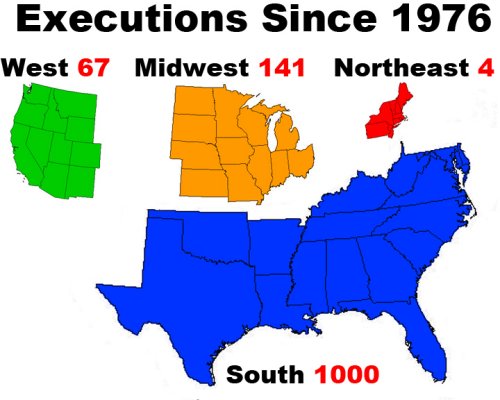
Death penalty popular among Bible Belt Christians
By Amy Green Associated Press Writer March 19, 2000
NASHVILLE, TN. (AP) : In this town known as the buckle of the Bible Belt, Christians readily cite the "eye for an eye" scripture rather than "thou shalt not kill" in explaining their position on capital punishment.
"We believe that the state has a God-given responsibility to protect society, and that the Bible tells us that includes the ultimate penalty," said Barrett Duke, vice president of research for the Southern Baptist Convention's Ethics and Religious Liberty Commission.
As Tennessee prepares to execute its first death row inmate in 40 years : Robert Coe on March 23 : the state falls in line with the rest of the South, where religious convictions run deep and executions are more frequent than anywhere else in the nation.
"I don't think it's any accident," said the Rev. Joe Ingle of Nashville, a death row minister since 1974 and a staunch opponent of the death penalty. "The Bible Belt is also the `Death Belt."
Since the U.S. Supreme Court reinstated capital punishment in 1976, 490 inmates in 12 Southern states have been put to death, compared to 119 elsewhere in the nation, according to the Death Penalty Information Center in Washington D.C.
Texas leads the nation with 211 executions and some 450 death row inmates, followed by Florida with 46 executions and some 390 death row inmates. Tennessee is the exception. It is the only Southern state that has not executed anyone since the 1976 decision. Explanations differ on why the 96 men and two women on Tennessee's death row have, up until now, been spared.
Don Welch, associate dean of the Vanderbilt University Law School, said protests from religious leaders who represent a vocal minority opposed to capital punishment are partly responsible.
"The work of folks like that have caused Tennessee to move more slowly toward executions," Welch said. But recent changes in state and federal laws limiting the number and the grounds for appeals for death row inmates have forced Tennessee to set execution dates.
The move suits conservative denominations like the Nashville-based Southern Baptists, the nation's largest Protestant faith. But Southern Baptists are not the only Christians supporting capital punishment.
According to 1998 statistics published by the U.S. Justice Department, 68 percent of Protestants and 68 percent of Catholics favored the death penalty, while 64 percent of those who cited no religious faith also expressed support.
Ron Mosby, a Church of Christ minister who volunteers at Riverbend Correctional Institution, where Tennessee's death row inmates are housed in Nashville, cites Genesis 9:6 in expressing his support of capital punishment: "Whoever sheds the blood of a human, by a human shall that person's blood be shed; for in his own image God made mankind."
"Jesus didn't come to pull the switch. He came to seek and save the lost," Mosby said. "The next time he comes he'll pull the switch." Other death penalty supporters look to Deuteronomy 19:21, "Show no pity: life for life, eye for eye, tooth for tooth, hand for hand, foot for foot."
But Harmon Wray, director of Nashville's Restorative Justice Ministries for the United Methodist Church, said death penalty supporters like Mosby are misinterpreting the Old Testament.
"There's a tendency to see God as a large, male sheriff with a gun ... ready to retaliate against anybody he doesn't like," Wray said. "I think (capital punishment) is at odds with true Christianity."
Wray points to Jesus' words in Matthew 5:38, "You have heard that it was said, `An eye for an eye and a tooth for a tooth." But I say to you, do not resist an evildoer. But if anyone strikes out on the right cheek, turn the other also; and if anyone wants to sue you and take your coat, give your cloak as well."
Death penalty opponents like Wray have been busy in recent months lobbying Gov. Don Sundquist to grant clemency for Coe and Philip Workman, a condemned murderer set for execution April 6.
Coe, 43, has confessed to kidnapping, raping and murdering 8-year-old Cary Ann Medlin of Greenfield in 1979. He said he cut her throat when she told him, "Jesus loves you."
Workman, 46, was convicted of fatally shooting Memphis police Lt. Ronald Oliver after robbing a fast-food restaurant in 1981. He says he's grown close to God during his time on death row and cites religious reasons for refusing to chose between the electric chair and lethal injection.
Under a new Tennessee law, death row inmates convicted before Jan. 1, 1999 are given a choice between the two. Those convicted after that date will receive lethal injection.
This month, religious leaders distributed some 25,000 postcards across the state asking citizens to send them to the governor requesting that he stop the upcoming executions.
Sundquist spokeswoman Beth Fortune said the governor will weigh each case individually before deciding on clemency. Ingle is among those pushing Sundquist to stop the executions. "Jesus' life and teachings are built around love and forgiveness and reconciliation," he said. "There is no way you can say that (He) would have supported a policy of revenge, which is what the death penalty is."

On July 14, 2010 Tennessee Governor Phil Bredesen commuted the death sentence of Gaile Owens to life in prison. Owens, who was sentenced to death in 1986 for hiring a man to kill her husband, had accepted a deal to plead guilty to the crime in exchange for a sentence of life in prison.
However, the man who did the killing refused to plead guilty, and prosecutors then rescinded the deal for Owens. Both co-defendants were sentenced to death. In deciding to commute her sentence to life in prison, Governor Bredesen said the decision was based in part on the plea bargain that was later withdrawn and the possibility that Owens was abused by her husband. Governor Bredesen said, "Nearly all the similar cases we looked at resulted in life-in-prison sentences."
- For some, religion and politics go hand in hand
- White-collar jobs joining blue-collar counterparts overseas
- Stand to Reason Commentary - Culture Wars II
- Death as Religion in the Bible Belt
- The Founding Fathers Speak Out on God, Religion and the First Amendment
- Less Welfare, Same Poverty in Heart of Appalachia
- Worlds Apart by Cynthia Duncan
- A Future Imperiled by Poverty
- How the ARC Wastes Millions
- Who Really Gets Mountain Money?
- Pierce Trial and Racism
- Poverty Myths
- War on Poverty and how the Poor Lost
- What Virginians Think
- A SHORT REVIEW OF PERSONAL EXPERIENCE IN THE UNITED PENTECOSTAL CHURCH
- More on the UPC
- Randy "Ruby Ridge" Weaver Christian hero in Sullivan County
- More on the Enlightenment
- Disability the Hidden Unemployment Program
- Steel Company Jumps County Line for Government Handouts
- Poverty and Guns Doesn't Equal Gun Crime
- CityMac Another Taxpayer Fiasco
- Layoffs Corporate Welfare at Eastman Chemical
- We Don't Hire People with College
- Single Parent Problem in Southwest Virginia
- Bristol Spends Millions for Jobs - Gets Nothing
- Raise Minimum Wage in Bristol
- Crime is Up Across Wise County Virginia
- 58 Meth Convections Illustrate Problem in Tri-Cities
- Jails and New Laws Won't Stop Meth Epidemic
- Tobacco Commission Failure Once Again in 2014
- Illegal alien nailed for child rape in Washington County Virginia
- The rape and murder of Channon Christian and Chris Newsom
- Immigration Plague
- Immigrants' Take Most of the New Jobs in Texas, Elsewhere
- Hispanic Welfare Class Won't Vote Republican
- Class Warfare - American People Versus Ruling Elite
- For Sale - Buying American Immigration Policy
- Illegal Immigration Plagues Tennessee
- Texas - Elsewhere - Immigrants Take Most New Jobs
- Race as an Issue in the 2012 Elections
- Exploring Religion and Environmentalism
- Taking a Sober View on Climate Change
- Social Agenda Behind Environmentalism
- Environmental-Government Complex is about Money

